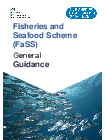The Fisheries and Seafood Scheme will provide financial support for projects in England that secure sustainable growth across the catching, processing and aquaculture sectors, and that protect and enhance the marine environment.
Aims of the Fisheries and Seafood Scheme The Fisheries and Seafood Scheme will provide financial assistance for projects that support sustainable growth in the catching, processing and aquaculture sectors, and enhance the marine environment. The scheme is available to applicants whose businesses and/or vessels are registered in England.
The scheme will provide funding for a range of projects that deliver the following seven strategic priorities:
- promoting a sustainable sector for future generations
- protecting the marine environment, by reducing the environmental impacts of the sector
- delivering world class science and innovation
- supporting coastal communities to promote economic growth and social inclusion supporting the reform of stock and quota management to ensure a balance between fishing opportunities and capacity
- enhancing the value chain through marketing and processing, opening the potential for English businesses home and abroad
- developing industry infrastructure which is essential to supporting sustainable growth across the whole sector.
Not all areas of the scheme will always be open for support. Some areas will be opened later and for a defined period, through a funding round.
Who can apply for funding? To be eligible for this scheme you must be one of the following:
Who can apply for funding? To be eligible for this scheme you must be one of the following:
- An individual or business engaged within commercial/recreational sea fishing, aquaculture or processing
- A public body/local authority in a local community that has a focus on fishing/aquaculture activities (including trust ports and local authority ports, and public bodies, using funds for environmental improvements/management of fisheries)
- A university or research institute
- A new entrant to the industry or unemployed individual that could benefit from knowledge/skills in fishing/aquaculture activities.
You will be required to declare if you have received funding from other Government financial support schemes and, if so, what for.
If you are a business, you will need to declare whether you fall into the category of micro-entities, small and medium enterprises (SMEs) or larger enterprises.
Who cannot apply for funding? You cannot apply for and receive funding if you have:
been convicted of fraud under any other fisheries scheme; been convicted of an offence that the MMO considers to be a ‘serious infringement ’ or fraud, in the 12 months before applying. Please read the Guidance on Inadmissibility and fraud here.
What activities the Fisheries and Seafood Scheme can support You must review the relevant guidance note for the project you are seeking funding for. These set out what you can and cannot apply for. The guidance notes cover:
If you are a business, you will need to declare whether you fall into the category of micro-entities, small and medium enterprises (SMEs) or larger enterprises.
Who cannot apply for funding? You cannot apply for and receive funding if you have:
been convicted of fraud under any other fisheries scheme; been convicted of an offence that the MMO considers to be a ‘serious infringement ’ or fraud, in the 12 months before applying. Please read the Guidance on Inadmissibility and fraud here.
What activities the Fisheries and Seafood Scheme can support You must review the relevant guidance note for the project you are seeking funding for. These set out what you can and cannot apply for. The guidance notes cover:
PDF, 359KB, 11 pages








